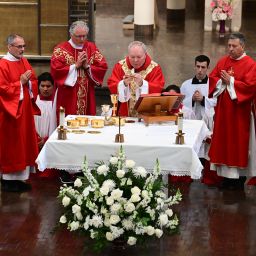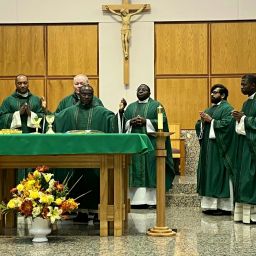By Father Jacob Dankasa
Special to The Texas Catholic
The sacrament of reconciliation – sometimes called confession or penance — brings us into communion with God. Through the sacrament of reconciliation, our relationship with God is restored and we become united with His grace. When we’re forgiven, we receive grace from God, grace which comes with the joy of being freed from the bonds of sin; and through this grace, we strive not to return to the same old way again. We can make the way we feel after the reception of the sacrament of reconciliation known to others; making our joyful experience of God’s love to us known to others is an act of evangelization that can bring others closer to God and allow them to experience that which we have experienced. There is healing in the sacrament of reconciliation.
One important way that we can relate to others and help them to have an awareness of, and appreciation for, the sacrament of reconciliation is by sharing the joys and graces we receive from confession. The family is one of the first institutions where we can create an understanding of the sacrament of reconciliation, because the joy of reconciliation with God can help us build a family of reconcilers, a place where reconciliation with one another becomes an easier process.
The sacrament of reconciliation is a sacrament of healing, and when an individual or a parent courageously shares with their friends or their children the joy they feel whenever they receive absolution, it introduces in that person, especially in children, a desire for that joy and an awareness of where to go at moments of desolation, or at times when the person needs peace and healing. Many people have shared with me how they feel relieved and have an internal sense of peace after receiving absolution from the priest.
As a priest I have received absolution in the sacrament of reconciliation myself, and I have always felt a tremendous grace and healing inside me, a feeling of having a heavy burden lifted. Sharing such experiences of healing and grace with your children (and other members of your family) can help them know where to go when they need grace and spiritual strength, especially at life’s lowest moments or when they are particularly aware of an occasion of sin. It is especially important for parents to make discussions about the grace of the sacrament of reconciliation a part of their family’s spiritual plan.
In a Catholic family, developing a plan for making the sacrament of reconciliation known as a source of grace and healing to family members is very important, not just for the spiritual health of individual members of the family but also for their mental and emotional health. The sacrament of reconciliation is one of the greatest gifts we Catholics have, but it’s also one of the most difficult for many people. The conscious decision to go and confess your sins to someone else is difficult for many of us. But for those who have overcome this hurdle and who have made the sacrament of reconciliation a practice, it is a source of grace and peace. It is therefore especially essential for Catholics and parents to model the habit of approaching the sacrament of reconciliation when they are conscious of sins they have committed. The more comfortable one becomes in approaching the sacrament of confession when conscious of a grave sin, the easier it is to help someone else see the value of the sacrament.
Confession brings grace, and the joy and relief that an individual feels after going for confession may be extended to the entire family. It’s a very good habit for families to have times when they sit together and reflect on the mercy of God. It’s by reflecting and becoming aware of the mercy of God toward each of us that we become conscious of the fact that, as beneficiaries of God’s mercy, we can also show mercy to others. When we contemplate the healing we receive from God’s forgiveness despite our numerous sins against Him, we become aware of the necessity for bringing healing to others. This is especially important and necessary in family life, where the possibility of conflicts is always present. We need to remind ourselves always of the mercy of God and the grace we receive through the sacrament of reconciliation.
When people develop an intimacy with God and know that they can go to Him for healing when they are at their lowest point, going to receive penance and absolution through the sacrament of reconciliation becomes easier.
Father Jacob Dankasa is the pastor of Holy Family of Nazareth Catholic Church in Irving.















